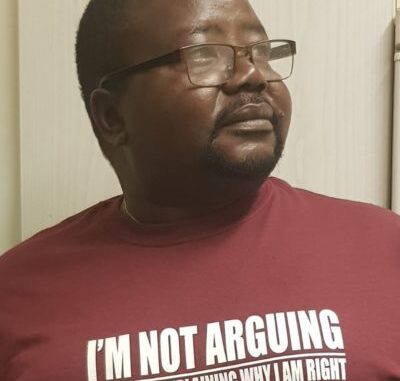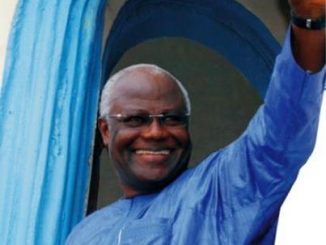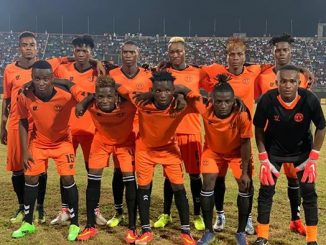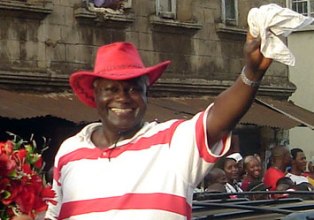
By Abdulai Mansaray
The world is in reverse gear as basic food and commodity prices present unprecedented threats to air traffic. Ukraine and Russia may be far way, but we cannot discount that when these countries sneeze; countries like Sierra Leone catch the cold. Nevertheless, we cannot hide from the fact that nefarious elements in our country have and continue to seize the opportunity to hike prices that even defy the dictates’ of Adam Smith. However, while we struggle to provide basic sustenance for our people, it is the right to speak that has caught the wind of discourse in our political corridors.
No one needs a reminder that democracy, in its strictest sense of the word remains a pipe dream for generations to come. That does not mean that we are not making efforts to improve our democratic credentials as a country. Nevertheless, old habits die hard. We noticed a seeming shift of affinity for democratic reforms; a bye product of our regrettable civil war. The corresponding investigations, root cause analyses and every facet of research that followed our civil war had one thread in common: Democracy or the lack of it was identified as one of the causal factors. It was not surprising then, that we saw many advocacy groups like the NGOs, and thanks to our Western partners, support the initiation and implementation of parastatals in this drive.
There is a common consensus that democracy is the best form of government. As an ongoing price we pay for the pursuit of the common good for all, many would rather see democracy as a means to protect the minority, than as a government of the people, by the people and for the people. How many democratic governments are of, by and for the people? Central to all or most democracies is the concept of “free speech or freedom of expression”.
It is an open secret that as a concept, our Public Order Act 1965 was meant to guarantee law and order in the country. It was in effect set to sanitise society and not only to protect citizens from citizens, but also protect citizens from our governments. It includes the right to worship, assembly and many other facets of our daily lives. To all intents and purposes, the Public Order Act was to ensure that we live our lives within the confines of acceptable civility.
Sadly and regrettably, this Act was adulterated by several governments, and instead became the sledgehammer with which any semblance of free speech or freedom of expression was summarily crushed. It was the SLPP Party, under its godfather Margai that set the stage to stifle dissenting voices. The late President Siaka Stevens later perfected the act, to ensure that his APC One Party government reigned unopposed. The media, whose members naturally filled the ensuing vacuum of political opposition, became perennial tenants of Pademba Road Prisons and CID headquarters. As governments from both the SLPP and APC continued to promise but failed to repeal the Act, it took 55 years and ironically President an SLPP President to preside over its repeal and fulfil the long awaited promise. That was a brave and laudable act in itself, so bravo.
Forward to post millennium, the internet age and the birth of social media. With newsprint at risk of becoming extinct, and with mass participation of driver citizens on the information highway, it was inevitable that societies would need to come up with measures to address the potential excesses of free speech and expression, especially on social media. We cannot deny that Journalism has gone cyber, and if in the wrong hands presents the inherent risks of destabilising, destroying and deconstructing not only societies but also the very fabric of “free speech” itself. With such risks, are we saying that social media should run riot unregulated? If we need to regulate the social media, can we do so without undermining the right to free speech? With the potential for good an evil, it was inevitable that governments around the world would come up with laws to protect societies from disintegrating, but at the same time protect the rights to free speech. Some balancing act Ehn?
Nevertheless, recent events in our country have left many wondering how free is free speech. Some people see the police as “too eager” to interpret the Cyber Law. However, are they at risk of pouring arsenic on Bio’s previously hailed, “repeal”? Several people, ranging from opposition party members, teachers, and other public members have been guests at the invitation of the police. Many found it perplexing when “Blacker”, a man some people, against any clinical evaluation, certify as mad was arrested. Others condemned the administration more vigorously when the former Minister of Transport and Aviation Kemoh Sesay was arrested, against the backdrop of his ailment. Kemoh’s arrest came after a video clip surfaced on social media, with him calling the president of Sierra Leone a thief and killer, among others. If we were to see Blacker and Mr Sesay on the social Richter scale, you would be forgiven to conclude that the police are taking a top to bottom approach. Is anyone spared?
This brings to mind the idea of criticism of the government. Should governments be criticised? Yes. Should government officials be criticised? Yes. Should presidents, leaders and public officials be criticised? Yes. Should they be insulted? You be the judge, but I say NO. So where do criticisms stop, and where do insults begin? Was Mr Sesay’s video clip an insult or criticism? Where do rights and responsibilities start and stop? The right to a right is saddled with responsibilities. It is these fine lines between rights and responsibilities, insults and criticisms, facts and lies, etc. that render our Public Order Act fluid. Such fluidity engenders the abuse of power.
With so many arrests linked to the seeming abuse of power and the inherent muzzling of free speech, is president Bio’s “repeal” of the libel act in danger of fizzling into hot air? Interestingly, the Public order Act has never been condemned in its entirety. It is a necessary tool to maintain law and order. What many have condemned about it is the criminalisation of the libel side of things. Why should someone go to jail for saying their piece? It is understandable if someone speech leads to incitement and subsequent damage to or loss of property. If someone’s free speech is tantamount to treason, a coup, or otherwise, perhaps a prison sentence could be used as commensurate. However, should every free speech be summarily treated as treasonable, criminal, etc.? Should it be based on the potential or actual outcome of such speech?
The Public Order Act, 1965 has always been condemned for its criminal element to it. Criminalising the libel act was always contentious. If a speech is found to be libellous, the defamatory aspect of such a speech should take precedence. This means that fines, retractions, apologies etc. should be enforced. We are aware that no amount of compensation can undo the damage caused by defamation. However, such can be used to punish the culprit and at the same time allow free speech or free responsible speech to prevail. So, were the arrests of these people justified? Are we in danger of going back to where it all started? Should the people be afraid of its government or vice versa? The government should accept that it would always face criticism, and should be ready to hear things it wont like and would offend it. Nevertheless, that is exactly what freedom of speech is about: the right to offend others. As for those who were arrested for their right to free speech, were they criticising or insulting? Are we right to criticise others? Are we right to insult them?
Words can be deleted, but not the facts with them. You can arrest someone’s opinion, can you?
Do not forget to turn the lights out before you leave the room.
RIP Junior Tumbu
Abdulai Mansaray



